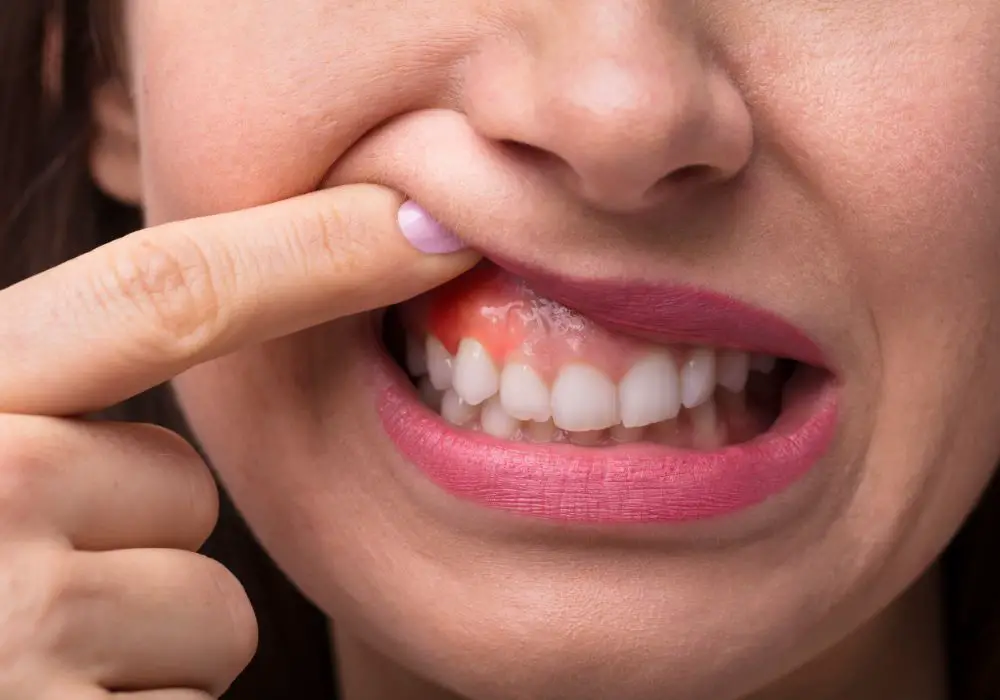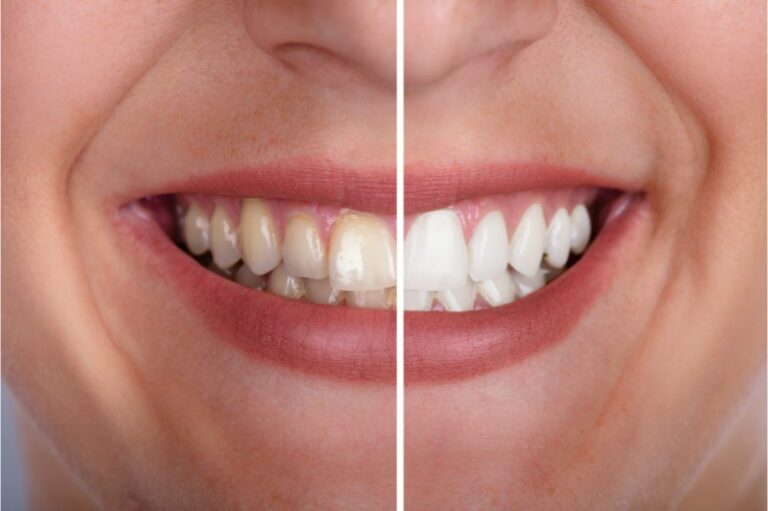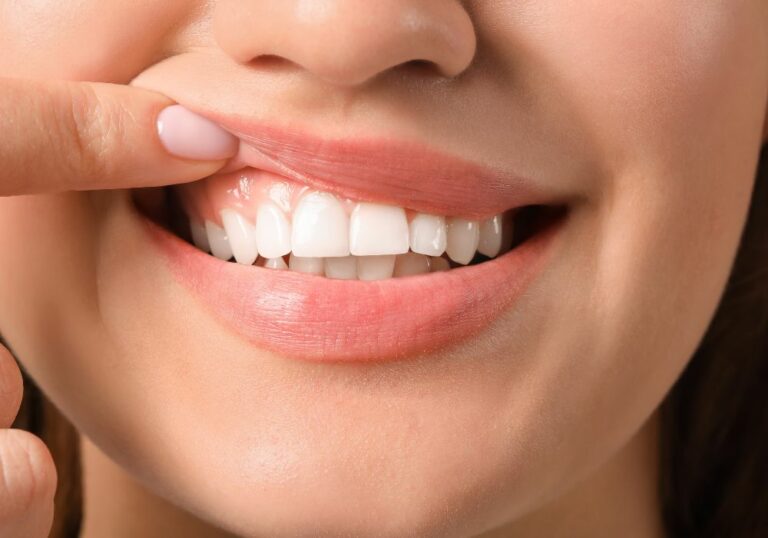Do you ever experience swollen teeth? Swollen teeth can be painful and uncomfortable, and it’s often caused by a bacterial infection. There are several reasons why your teeth can become swollen, including tooth abscess, gingivitis, and periodontitis.
A tooth abscess is a pocket of pus that’s caused by a bacterial infection. It can occur at different areas near the tooth for different reasons. A periapical abscess occurs at the tip of the root, while a periodontal abscess occurs in the gums at the side of a tooth root. Gingivitis is a common and mild form of gum disease that causes irritation, redness, and swelling of your gingiva, the part of your gum around the base of your teeth. If left untreated, gingivitis can lead to periodontitis, which is a more severe form of gum disease. Periodontitis can cause swollen or puffy gums, bleeding gums, bad breath, and even tooth loss.
In this article, we will explore the different causes of swollen teeth and how to relieve discomfort. We’ll also discuss prevention methods and when to see a dentist. Whether you’re experiencing swollen teeth or want to prevent it from happening in the future, this article will provide you with the information you need to know.
Understanding Swollen Teeth

Swollen teeth can be a painful and uncomfortable experience. It’s important to understand the causes of swollen teeth so that you can take steps to prevent them from occurring in the first place.
One of the most common causes of swollen teeth is a tooth abscess. This occurs when there is a bacterial infection in the tooth, leading to the formation of pus. The abscess can occur at different areas near the tooth for different reasons. A periapical abscess occurs at the tip of the root, while a periodontal abscess occurs in the gums at the side of a tooth root. If left untreated, a tooth abscess can lead to serious complications such as bone loss or tooth loss.
Another cause of swollen teeth is periodontitis, also known as gum disease. This is a serious gum infection that damages the soft tissue around teeth. Without treatment, periodontitis can destroy the bone that supports your teeth, leading to tooth loss.
Swollen teeth can also be caused by a dental injury, a cracked tooth, a loose filling, a broken filling, inflammation of the pulp inside your tooth, receding gums, or a sinus infection. In some cases, tooth pain and swelling can be accompanied by a fever or even trouble breathing or swallowing. If this happens, it’s important to receive care immediately.
To prevent swollen teeth, it’s important to practice good oral hygiene. This includes brushing your teeth twice a day, flossing daily, and visiting your dentist regularly for checkups and cleanings. If you experience any signs of swollen teeth, such as pain or discomfort, it’s important to see your dentist as soon as possible to prevent further complications.
Common Causes of Swollen Teeth
If you’re experiencing swelling in your teeth and gums, it’s important to understand the underlying causes. Here are some of the most common reasons why your teeth may be swollen:
Dental Abscess
A dental abscess is a pocket of pus that forms in the tooth or gums. It’s usually caused by a bacterial infection and can be very painful. Some of the symptoms of a dental abscess include:
- Severe, constant toothache
- Swelling in the gums or face
- Sensitivity to hot and cold temperatures
- Fever or chills
If you suspect that you have a dental abscess, it’s important to see your dentist right away. Treatment usually involves draining the abscess and taking antibiotics to clear up the infection.
Gum Disease
Gum disease, also known as periodontitis, is an infection of the gums that can cause swelling, redness, and bleeding. It’s usually caused by a buildup of plaque on the teeth, which can lead to inflammation and infection. Some of the symptoms of gum disease include:
- Swollen, red, or tender gums
- Bleeding when you brush or floss
- Receding gums or loose teeth
- Chronic bad breath
Gum disease can usually be prevented with good oral hygiene habits, such as brushing and flossing regularly and getting regular dental checkups.
Tooth Decay
Tooth decay is a common condition that occurs when the bacteria in your mouth produce acid that eats away at the enamel on your teeth. If left untreated, tooth decay can lead to swelling and infection in the gums. Some of the symptoms of tooth decay include:
- Sensitivity to hot and cold temperatures
- Pain when chewing or biting
- Visible holes or pits in the teeth
- Discoloration or dark spots on the teeth
Tooth decay can usually be prevented with good oral hygiene habits and regular dental checkups.
Injury to the Mouth
Injury to the mouth, such as a blow to the face or a cut on the gums, can cause swelling and pain in the teeth and gums. If you’ve experienced an injury to the mouth, it’s important to see your dentist right away. Depending on the severity of the injury, treatment may involve antibiotics, pain relievers, or surgery.
By understanding the common causes of swollen teeth, you can take steps to prevent and treat this uncomfortable condition. If you’re experiencing swelling in your teeth and gums, make an appointment with your dentist to get a proper diagnosis and treatment plan.
Symptoms Associated with Swollen Teeth

If you have swollen teeth, you may experience several symptoms that can be uncomfortable and painful. Here are some of the common symptoms associated with swollen teeth:
Pain and Discomfort
Swollen teeth can be painful and uncomfortable, especially when you try to eat or drink. You may feel a throbbing pain in your teeth or gums, and the pain may worsen when you bite down or apply pressure to the affected area. The pain can also radiate to your jaw, ears, or head, making it difficult to concentrate or sleep.
Redness and Inflammation
Swollen teeth can cause redness and inflammation in your gums and surrounding tissues. Your gums may appear swollen, tender, and bleed easily when you brush or floss. The affected area may also feel warm to the touch, and you may notice pus or discharge coming from your gums.
Difficulty in Eating
Swollen teeth can make it difficult to eat or drink, especially if the affected teeth are located in the back of your mouth. You may experience pain or discomfort when you chew or swallow, and you may have to avoid certain foods or drinks that can aggravate your symptoms.
If you experience any of these symptoms, it’s important to seek prompt dental care to prevent further complications. Your dentist can diagnose the underlying cause of your swollen teeth and recommend appropriate treatment options to alleviate your symptoms and restore your oral health.
Prevention Strategies
To prevent swollen teeth, there are several strategies you can follow. These include regular dental check-ups, proper oral hygiene, and a healthy diet.
Regular Dental Check-ups
Regular dental check-ups are essential in preventing swollen teeth. During a check-up, your dentist can identify any potential problems and provide treatment before they worsen. It is recommended to visit your dentist every six months for a check-up.
Proper Oral Hygiene
Proper oral hygiene is crucial in preventing swollen teeth. Brush your teeth at least twice a day with fluoride toothpaste, and floss daily to remove any plaque or food particles that may be stuck between your teeth. You can also use an antiseptic mouthwash to kill any bacteria that may be present in your mouth.
Healthy Diet
Eating a healthy diet can also help prevent swollen teeth. Avoid sugary and acidic foods and drinks, as they can erode your tooth enamel and lead to cavities. Instead, opt for foods that are rich in calcium, such as dairy products, as they can strengthen your teeth.
By following these prevention strategies, you can reduce your risk of developing swollen teeth and maintain good oral health. Remember to schedule regular dental check-ups, practice proper oral hygiene, and eat a healthy diet to keep your teeth and gums healthy.
When to Seek Medical Attention

If you are experiencing swollen teeth, it is important to monitor your symptoms and seek medical attention if they persist or worsen. Here are some signs that you should seek medical attention:
Persistent Pain
If you have persistent pain in your teeth, it could be a sign of a more serious condition such as an abscess or infection. Over-the-counter pain relievers may provide temporary relief, but it is important to see a dentist or doctor to determine the underlying cause of the pain.
Fever and General Illness
If you have a fever or other symptoms of illness in addition to swollen teeth, it could be a sign of a systemic infection. This type of infection can be serious and requires prompt medical attention. Be sure to inform your healthcare provider of all your symptoms.
Difficulty in Breathing or Swallowing
If you experience difficulty breathing or swallowing in addition to swollen teeth, it could be a sign of a serious infection or abscess. Seek medical attention immediately if you have these symptoms.
In general, if you are experiencing any symptoms that are causing you concern, it is always better to err on the side of caution and seek medical attention. Your healthcare provider can help you determine the underlying cause of your symptoms and provide appropriate treatment.
Frequently Asked Questions
What are some remedies for swollen gums?
If you have swollen gums, there are a few remedies you can try at home. You can rinse your mouth with warm salt water, use an ice pack on your cheeks, or try using a warm compress on the affected area. Additionally, you can try using an over-the-counter anti-inflammatory medication, such as ibuprofen.
Why do gums become swollen?
Gums can become swollen for a variety of reasons. Some of the most common causes include poor oral hygiene, gum disease, hormonal changes, and certain medications. Additionally, gum swelling can be a symptom of a more serious underlying condition, such as an abscess or a cyst.
What are some common causes of gum swelling?
There are many different things that can cause gum swelling. Some of the most common include poor oral hygiene, gum disease, hormonal changes, and certain medications. Additionally, gum swelling can be caused by an abscess, a cyst, or an injury to the gums.
How can I prevent gum swelling?
The best way to prevent gum swelling is to practice good oral hygiene. This includes brushing your teeth twice a day, flossing regularly, and visiting your dentist for regular checkups. Additionally, you can avoid smoking or using tobacco products, which can increase your risk of gum disease and other oral health problems.
What are the symptoms of gum swelling?
The symptoms of gum swelling can vary depending on the underlying cause. Some common symptoms include redness, tenderness, bleeding, and pain in the gums. Additionally, you may notice swelling or a lump in the affected area, or you may have bad breath or a bad taste in your mouth.
When should I see a dentist for swollen gums?
If you have swollen gums that are causing you pain or discomfort, or if you notice any other symptoms such as bleeding or bad breath, it’s important to see a dentist as soon as possible. Your dentist can help determine the underlying cause of your gum swelling and recommend the best course of treatment.






